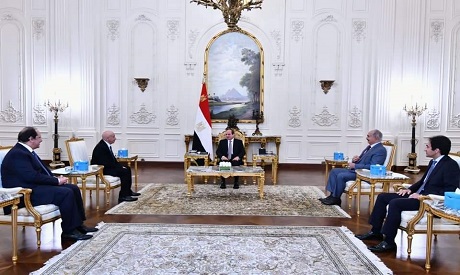
Egyptian President Abdel-Fattah El-Sisi during a meeting with the speaker of the Libyan House of Representatives Aguila Saleh and Libyan National Army commander Khalifa Haftar in Cairo on Tuesday, 14 September 2021 (Egyptian presidency)
Egyptian President Abdel-Fattah El-Sisi has assured that Egypt will continue coordinating with all Libyan parties to help ensure the unity of Libya's national institutions and the holding of long-awaited parliamentary and presidential elections in December.
El-Sisi made the remarks during a meeting with the speaker of the Libyan House of Representatives Aguila Saleh and Libyan National Army commander Khalifa Haftar in Cairo on Tuesday.
The meeting, which was attended by the head of Egypt's General Intelligence Service Abbas Kamel, tackled the latest developments in the neighbouring country, whose stability is viewed as critical to Egypt’s own national security.
El-Sisi stressed to the Libyan officials the necessity of expelling all foreign forces and mercenaries from Libya and preventing foreign interventions, which aim to implement agendas at the expense of the Libyan people.
Egypt has repeatedly called for the immediate exit of all foreign forces and mercenaries from the North African country, with which it shares a 1,115 kilometre-long border.
The Egyptian calls are in line with demands made by other international and regional powers in order to firm up the ceasefire that came into effect in October.
Saleh and Haftar hailed Egypt’s ongoing efforts to support the Libyan people in managing the transitional period as well as its contribution to uniting the Libyan army, Rady noted.
The two Libyan officials asserted that they agreed with Egypt’s vision on managing the transitional stage, especially the necessity of holding the parliamentary and presidential elections before the end of 2021, as well as reinforcing national security and expelling all mercenaries and foreign troops from Libya.
The oil-rich country was gripped by violence and political turmoil following the ouster and murder of its leader Muammar Gaddafi on the heels of a NATO-backed uprising in 2011.
In recent years, Libya was torn between warring administrations, one in the east and one in the west, before the two camps signed a ceasefire in Geneva last year and an interim government was established earlier this year to guide the country towards national elections slated for December.
However, there are still divisions between Libyan parties over when to hold elections, which elections to hold, and on what constitutional grounds.
Short link: